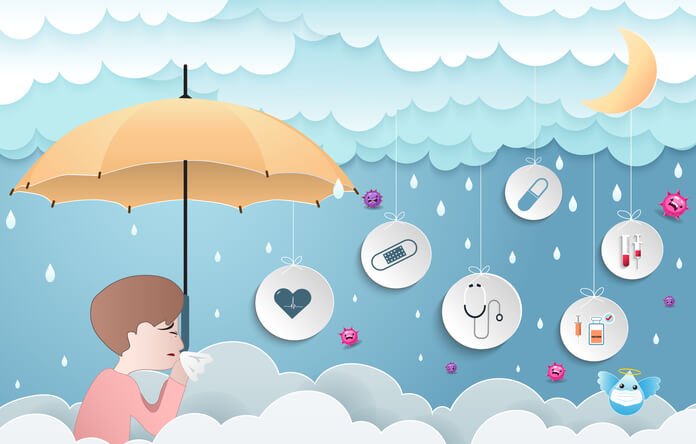Monsoon Illness Symptoms and Vital Tips To Rain-Proof Yourself

Though, monsoon has begun now. Along with providing that much-needed relief from the scorching heat, it also tends to invite a plethora of diseases and infections that can be life-threatening to your family and you. But you need not worry as staying healthy during the rainy season can be easy if you take appropriate precautionary measures and enhance your quality of life. So, don’t forget to stay away from mosquito bites, stagnated water and follow a well-balanced diet.
Monsoon is pleasing! After that agonizing summer, many of us wait for this season to enjoy rains, go on long drives, and eat our favorite foods such as bhajiya, corn, and garma-garam chai. But monsoon is a lot more than this and can also give you nightmares. Yes, you have heard it right! Monsoon brings with it several diseases and infections. Did you know? The risk of being exposed to multiple viruses, bacteria, and other infections goes up during rainy days.
You will be shocked to know that the high moisture content present in the air leads to harmful microorganisms to thrive, resulting in the transmission of a host of diseases. Thus, an early diagnosis, and basic hygiene and preventive measures can do the trick. It will help you to keep those monsoon diseases at bay and lead a healthy life.
Below we list out few monsoon diseases and tips to deal with them
It is no brainer that the most common diseases during monsoons are transmitted via 4 major mediums: mosquitoes, water, air, and contaminated food. Moreover, mosquito-borne infections are also on the rise. This is so because the monsoons are a breeding season for mosquitoes and even the mosquito-borne diseases.
- Malaria is caused by a single-celled parasite known as Plasmodium. Malaria cases are rising at a rapid rate in Mumbai and are one of the major health concerns during monsoon. Along with Coronavirus, malaria also possesses a risk. To detect malaria, one must do a malarial parasite detection tests by microscopy and rapid antigen detection test. Ideally, this should be carried out before anti-malarial treatment is started.
- Dengue-causing Aedes aegypti mosquito breeds in stagnant water (such as in buckets, drums, flowerpots, wells, and tree holes). One may notice fever and fatigue that are signs of dengue fever after four to seven days if one is bitten by the dengue causing mosquito. Dropping of platelets is the first indication of dengue fever. Hence, regular platelet monitoring is the need of the hour during monsoon. Other common tests conducted are CBC (complete blood count, dengue IgM, and NS1 dengue antigen).
- One may suffer from Chikungunya, due to the Aedes albopictus mosquito. ‘Chikungunya’ means which bends up and is called so because of its distinct arthritic symptoms (pain in the joints and bones, stiffness). The virus isolation is the most definitive test although it takes one or two weeks for the completion. One can also opt for the Chikungunya IgM test.
Water-Borne Diseases
Waterborne diseases are illnesses that occur owing to the microscopic organisms, like viruses and bacteria that are ingested through contaminated water or by coming in contact with feces. Some common waterborne diseases are Typhoid fever, malaria, cholera, hepatitis, worms, etc.
Here, we explain in detail.
Typhoid, which is caused by S. Typhi bacteria, is a water-borne disease that spreads due to poor sanitation. Eating uncovered or spoilt food and drinking contaminated water are the two major causes of typhoid. One may exhibit symptoms such as fever, headache, joint pain, and sore throat. The test for typhoid fever is blood culture. Rapid Typhi IGM and Widal agglutination are some of the common tests to detect typhoid fever.
Cholera occurs due to poor sanitation and the consumption of contaminated food, which is accompanied by diarrhea or loose of motions. Rapid cholera dipstick tests can help in the diagnosis of it.
Gastrointestinal infections like vomiting, diarrhea, and gastroenteritis are caused due to eating stale, uncovered, or contaminated food and water. It is advised to boil water before drinking and keep all foods covered to avoid stomach infections.
Hepatitis A can be termed as a viral infection that tends to spread via contaminated food and water. It can even damage your liver. Its symptoms are fatigue, fever, and tenderness in the stomach, yellow eyes, dark-colored urine, and a sudden loss of appetite. The diagnosis of it is made by blood tests that detect viral antigen and hepatitis A IgM antibodies. Regular full-body health check-ups and/or blood tests can be helpful.
Follow these essential tricks to keep water-borne disease away
- Always boil water, and wash fruits and vegetables thoroughly before eating them
- Keep your food covered and avoid consumption of outside food
- Ensure proper hygiene is maintained at all times (carry a hand sanitizer or wash your hands often)
- See to it that the open drains and potholes in your locality are covered
- Get your children vaccinated
Air Borne Diseases
Monsoon brings with its multiple air-borne infections that are transmitted by tiny pathogens via air, inviting common flu, viral fever, cold, cough, and sore throat. Here are some of the most common air-borne diseases
- Cold and flu caused due to the sudden fluctuations in temperatures during the monsoon and is accompanied by a runny nose, sore throat, watery eyes, fever, and chills.
- Influenza, known as the seasonal "flu", spreads easily from one person to another via air. Viral isolation, detection of viral antigen by immune specific assays, such as immunofluorescence microscopy, and detection of viral nucleic acid by use of amplification techniques (i.e., nucleic acid testing [NAT]). Antibody detection is accomplished by virus neutralization (virus NT) and hemagglutination inhibition (HI) tests.
Here are some measures to tackle air-borne diseases
- Cover your mouth and nose while coughing or sneezing
- Drink boiled water every few hours
- Keep your children away from people who are already infected and ensure they wash their hands and feet thoroughly once home from outdoors
- Ensure your homes are always well- ventilated
Tips to stay in top shape during those rainy days
- Keep yourself hydrated: Ensure you drink only boiled water, and avoid drinking anything outside
- Follow strict personal hygiene routine at all times to avoid fungal infections
- Wear full-sleeved clothes to protect yourself from mosquito bites
- Eat freshly washed, boiled vegetables, reduce your intake of fats, oils, and sodium, and avoid dairy products as they can contain microorganisms that are harmful to your health. Include all essential vitamins and minerals in your diet. Eating kale, kiwi, orange juice, strawberries, and tomatoes can help strengthen the immune system.
- Eat probiotics to keep your gut healthy.
- Turmeric has anti-inflammatory and antioxidant properties and can help you enhance your immunity.
- Garlic can help cure a common cold as it involves a cold-fighting compound known as allicin which has demonstrated antibacterial and antifungal properties.
- Ginger can help you get relief from respiratory problems and strengthen the immunity owing to the anti-inflammatory gingerols and shaogals present in it.
- Use mosquito repellants and nets in your house.
- Don’t allow water to stagnate or collect anywhere in and around the house.















































